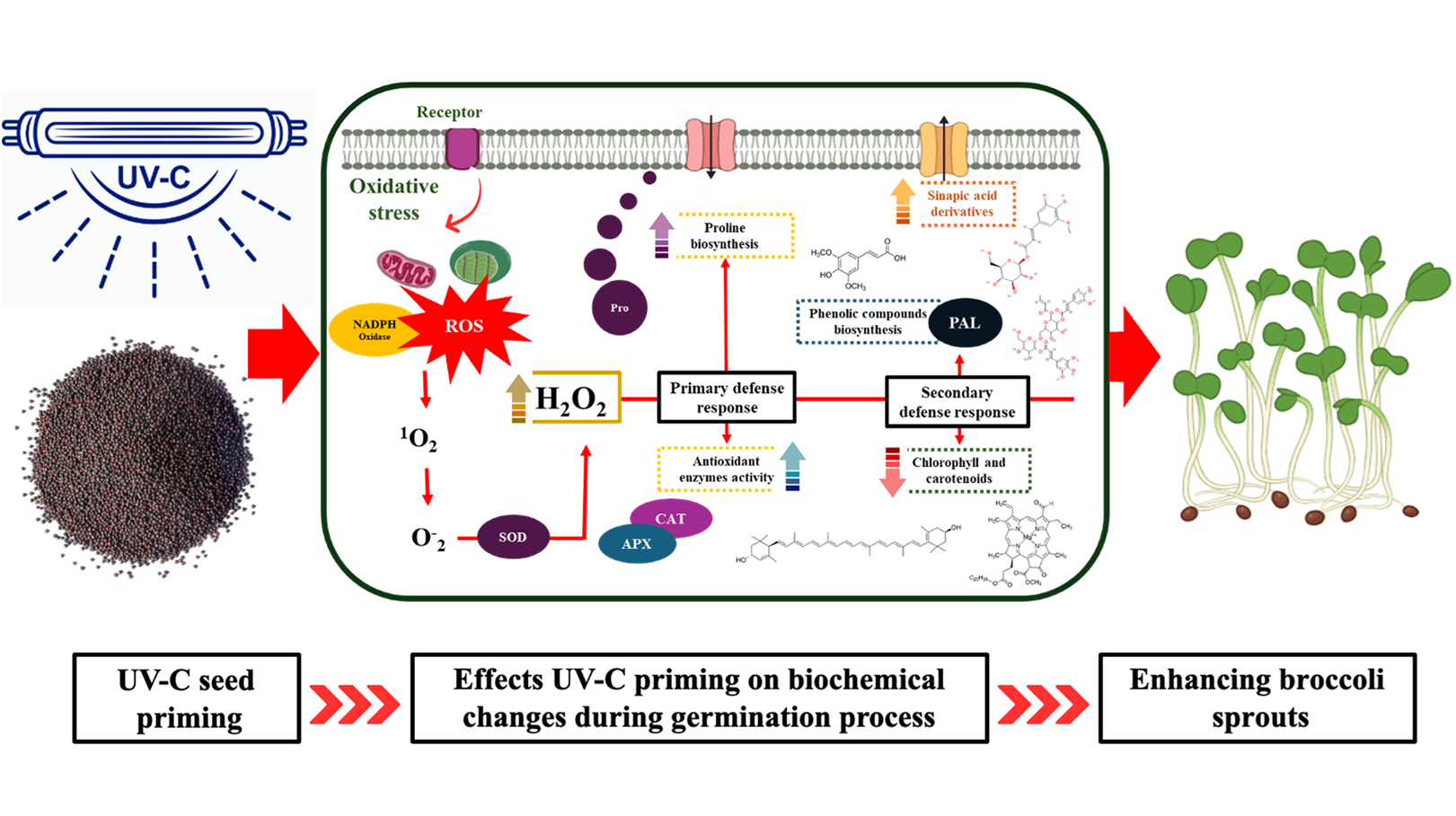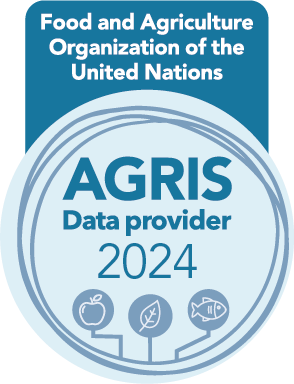UV-C priming enhances antioxidant mechanisms and bioactive compound biosynthesis in broccoli sprouts
DOI:
https://doi.org/10.17268/sci.agropecu.2025.049Palabras clave:
proline, biocompounds, antioxidant system, broccoli sprouts, UV-C radiationCitas
Abellán, Á., Domínguez-Perles, R., Moreno, D. A., & García-Viguera, C. (2019). Sorting out the value of cruciferous sprouts as sources of bioactive compounds for nutrition and health. Nutrients, 11(2), 429. https://doi.org/10.3390/nu11020429
Alagoz, S. M., Lajayer, B. A., & Ghorbanpour, M. (2023). Proline and soluble carbohydrates biosynthesis and their roles in plants under abiotic stresses. In Plant Stress Mitigators (pp. 169-185). Academic Press. https://doi.org/10.1016/b978-0-323-89871-3.00027-6
Ampofo, J. O., & Ngadi, M. (2020). Ultrasonic assisted phenolic elicitation and antioxidant potential of common bean (Phaseolus vulgaris) sprouts. Ultrasonics Sonochemistry, 64, 104974. https://doi.org/10.1016/j.ultsonch.2020.104974
Artés–Hernández, F., Miranda-Molina, F. D., Klug, T. V., & Martínez–Hernández, G. B. (2022). Enrichment of glucosinolate and carotenoid contents of mustard sprouts by using green elicitors during germination. Journal of Food Composition and Analysis, 110, 104546. https://doi.org/10.1016/j.jfca.2022.104546
Bates L. S., Waldren R. P., and I. D. Teare. (1973). Rapid determination of free proline for water-stress studies. Plant Soil, 39, 205-207. https://doi.org/10.1007/bf00018060
Bilgin, A. B., & Akocak, P. B. (2024). Improved postharvest quality attributes of sweet and sour cherry by using low pressure UV-C versus light-emitting diodes (LEDs). Scientia Horticulturae, 327, 112860. https://doi.org/10.1016/j.scienta.2024.112860
Cao, N., Fan, J., Yang, Z., Hao, L., Kang, Q., Liu, X., & Lu, J. (2020). Increasing Antioxidant Potentials of Mung Bean Sprouts. Current Topics in Nutraceutical Research, 18(1), 75-82.
Ercan, I., Tombuloglu, H., Alqahtani, N., Alotaibi, B., Bamhrez, M., et al. (2022). Magnetic field effects on the magnetic properties, germination, chlorophyll fluorescence, and nutrient content of barley (Hordeum vulgare L.). Plant Physiology and Biochemistry, 170, 36-48. https://doi.org/10.1016/j.plaphy.2021.11.033
Escobar-Hernández, D. I., González-García, Y., Olivares-Sáenz, E., & Juárez-Maldonado, A. (2024). Seedling priming with UV-A radiation induces positive responses in tomato and bell pepper plants under water stress. Scientia Horticulturae, 332, 113235. https://doi.org/10.1016/j.scienta.2024.113235
García‐Mosqueda, C., Cerón‐García, A., León‐Galván, M. F., Ozuna, C., López‐Malo, A., & Sosa‐Morales, M. E. (2023). Changes in phenolics and flavonoids in amaranth and soybean sprouts after UV‐C treatment. Journal of Food Science, 88(4), 1280-1291. https://doi.org/10.1111/1750-3841.16527
Gómez-Sagasti, M. T., López-Pozo, M., Artetxe, U., Becerril, J. M., Hernández, A., García-Plazaola, J. I., & Esteban, R. (2023). Carotenoids and their derivatives: A “Swiss Army knife-like” multifunctional tool for fine-tuning plant-environment interactions. Environmental and Experimental Botany, 207, 105229. https://doi.org/10.1016/j.envexpbot.2023.105229
Hernández-Aguilar, C., Dominguez-Pacheco, A., Tenango, M. P., Valderrama-Bravo, C., Hernández, M. S., Cruz-Orea, A., & Ordonez-Miranda, J. (2021). Characterization of bean seeds, germination, and phenolic compounds of seedlings by UV-C radiation. Journal of Plant Growth Regulation, 40(2), 642-655. https://doi.org/10.1007/s00344-020-10125-0
Jhanji, S., Goyal, E., Chumber, M., & Kaur, G. (2024). Exploring fine tuning between phytohormones and ROS signaling cascade in regulation of seed dormancy, germination and seedling development. Plant Physiology and Biochemistry, 108352. https://doi.org/10.1016/j.plaphy.2024.108352
Ji, H., Tang, W., Zhou, X., & Wu, Y. (2016). Combined effects of blue and ultraviolet lights on the accumulation of flavonoids in Tartary buckwheat sprouts. Polish Journal of Food and Nutrition Sciences, 66(2), 93-98. https://doi.org/10.1515/pjfns-2015-0042
Khanam, U. K. S., Oba, S., Yanase, E., & Murakami, Y. (2012). Phenolic acids, flavonoids and total antioxidant capacity of selected leafy vegetables. Journal of Functional Foods, 4(4), 979-987. https://doi.org/10.1016/j.jff.2012.07.006
Li, C., Song, S., Yue, Y., & Liu, H. (2025). Preharvest CaCl2-HCl electrolyzed water treatment maintained the quality of broccoli sprouts during storage. Journal of Future Foods, 5(2), 208-217. https://doi.org/10.1016/j.jfutfo.2024.05.010
Li, L., Ma, P., Nirasawa, S., & Liu, H. (2024). Formation, immunomo-dulatory activities, and enhancement of glucosinolates and sulforaphane in broccoli sprouts: a review for maximizing the health benefits to human. Critical Reviews in Food Science and Nutrition, 64(20), 7118-7148. https://doi.org/10.1080/10408398.2023.2181311
Mariz-Ponte, N., Mendes, R.J., Sario, S., Melo, P., & Santos, C. (2018). Moderate UV-A supplementation benefits tomato seed and seedling invigoration: a contribution to the use of UV in seed technology. Scientia Horticulturae, 235, 357-366. https://doi.org/10.1016/j.scienta.2018.03.025
Moreira-Rodríguez, M., Nair, V., Benavides, J., Cisneros-Zevallos, L., & Jacobo-Velázquez, D. A. (2017). UVA, UVB light doses and harvesting time differentially tailor glucosinolate and phenolic profiles in broccoli sprouts. Molecules, 22(7), 1065. https://doi.org/10.3390/molecules22071065
Ozuna, C., Cerón-García, A., Sosa-Morales, M. E., Salazar-Goméz, J. A., León-Galván, M. F., Abraham-Juárez, M. R. (2018). Electrically induced changes in amaranth seed enzymatic activity and their effect on bioactive compounds content after germination. Journal of Food Science and Technology, 55, 648-657. https://doi.org/10.1007/s13197-017-2974-0
Paucar-Menacho, L.M., Peñas, E., Dueñas, M., Frias, J., & Martínez-Villaluenga, C. (2017). Optimizing germination conditions to enhance the accumulation of bioactive compounds and the antioxidant activity of kiwicha (Amaranthus caudatus) using response surface methodology. LWT-Food Science and Technology, 76, 245-252. https://doi.org/10.1016/j.lwt.2016.07.038
Piechowiak, T. (2024). Elucidation of the mechanism of elicitation of edible sprouts using UV-C radiation. Biocatalysis and Agricultural Biotechnology, 103081. https://doi.org/10.1016/j.bcab.2024.103081
Piechowiak, T., & Balawejder, M. (2025). Succinic acid treatment enhances energy metabolism and antioxidant biosynthesis in radish sprouts. Journal of Biotechnology, 404, 144-151. https://doi.org/10.1016/j.jbiotec.2025.04.017
Rizi, M.R., Azizi, A., Sayyari, M., Mirzaie-Asl, A., & Conti, L. (2021). Increased phenylpropanoids production in UV-B irradiated Salvia verticillate as a consequence of altered genes expres-sion in young leaves. Plant Physiology and Biochemistry, 167, 174-184. https://doi.org/10.1016/j.plaphy.2021.07.037
Santin, M., Sciampagna, M. C., Mannucci, A., Puccinelli, M., Angelini, L. G., et al. (2022). Supplemental UV-B exposure influences the biomass and the content of bioactive compounds in Linum usitatissimum L. sprouts and microgreens. Horticulturae, 8(3), 213. https://doi.org/10.3390/horticulturae8030213
Sen, A., & Puthur, J. T. (2021). Halo- and UV-B priming-mediated drought tolerance and recovery in rice seedlings. Plant Stress, 2, 100011. https://doi.org/10.1016/j.stress.2021.100011
Slinkard, K., & Singleton, V. L. (1977). Total phenol analysis: auto-mation and comparison with manual methods. American Journal of Enology and Viticulture, 28(1), 49-55. https://doi.org/10.5344/ajev.1977.28.1.49
Terletskaya, N., Zobova, N., Stupko, V., & Shuyskaya, E. (2017). Growth and photosynthetic reactions of different species of wheat seedlings under drought and salt stress. Periodicum Biologorum, 119(1), 37-45. https://doi.org/10.18054/pb.v119i1.4408
Thomas, T. D., Dinakar, C., & Puthur, J. T. (2020). Effect of UV-B priming on the abiotic stress tolerance of stress-sensitive rice seedlings: Priming imprints and cross-tolerance. Plant Physiology and Biochemistry, 147, 21-30. https://doi.org/10.1016/j.plaphy.2019.12.002
Tian, X., Hu, M., Yang, J., Yin, Y., & Fang, W. (2024). Ultraviolet-B Radiation Stimulates Flavonoid Biosynthesis and Antioxidant Systems in Buckwheat Sprouts. Foods, 13(22), 3650. https://doi.org/10.3390/foods13223650
Urban, L., Charles, F., de Miranda, M.R.A., & Aarrouf, J. (2016). Understanding the physiological effects of UV-C light and exploiting its agronomic potential before and after harvest. Plant Physiology and Biochemistry, 105, 1-11. https://doi.org/10.1016/j.plaphy.2016.04.004
Verdaguer, D., Jansen, M.A., Llorens, L., Morales, L.O., & Neugart, S. (2017). UV-A radiation effects on higher plants: Exploring the known unknown. Plant science, 255, 72-81. https://doi.org/10.1016/j.plantsci.2016.11.014
Wang, M., Li, Y., Yang, Y., Tao, H., Mustafa, G., et al. (2023). Biofortification of health-promoting glucosinolates in cruciferous sprouts along the whole agro-food chain. Trends in Food Science & Technology, 104164. https://doi.org/10.1016/j.tifs.2023.104164
Xia, Y., Li, M. Y., Wadood, S. A., Hong, H. J., Liu, Y., et al. (2024). Identification of volatile and flavor metabolites in three varieties of broccoli sprouts. Food Chemistry: X, 24, 101862. https://doi.org/10.1016/j.fochx.2024.101862
Zhu, T., Yang, J., Zhang, D., Cai, Q., Zhou, D., et al. (2020). Effects of white LED light and UV-C radiation on stilbene biosynthesis and phytochemicals accumulation identified by UHPLC–MS/MS during peanut (Arachis hypogaea L.) germination. Journal of Agricultural and Food Chemistry, 68(21), 5900-5909. https://doi.org/10.1021/acs.jafc.0c01178

Descargas
Publicado
Cómo citar
Número
Sección
Licencia
Derechos de autor 2025 Scientia Agropecuaria

Esta obra está bajo una licencia internacional Creative Commons Atribución-NoComercial 4.0.
Los autores que publican en esta revista aceptan los siguientes términos:
a. Los autores conservan los derechos de autor y conceden a la revista el derecho publicación, simultáneamente licenciada bajo una licencia de Creative Commons que permite a otros compartir el trabajo, pero citando la publicación inicial en esta revista.
b. Los autores pueden celebrar acuerdos contractuales adicionales separados para la distribución no exclusiva de la versión publicada de la obra de la revista (por ejemplo, publicarla en un repositorio institucional o publicarla en un libro), pero citando la publicación inicial en esta revista.
c. Se permite y anima a los autores a publicar su trabajo en línea (por ejemplo, en repositorios institucionales o en su sitio web) antes y durante el proceso de presentación, ya que puede conducir a intercambios productivos, así como una mayor citación del trabajo publicado (ver efecto del acceso abierto).




